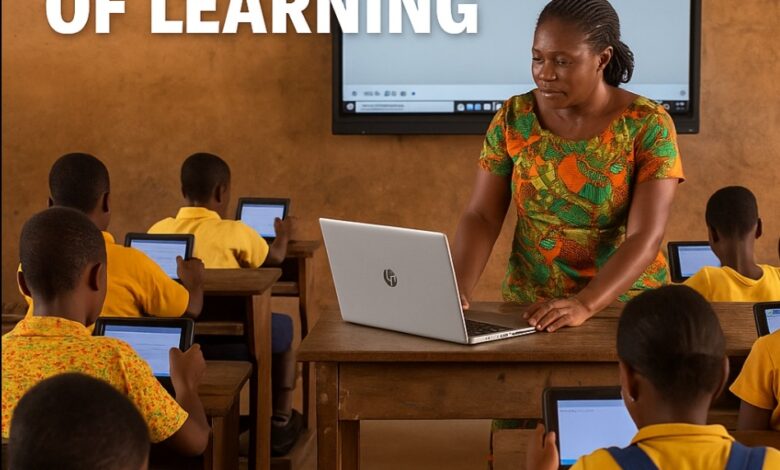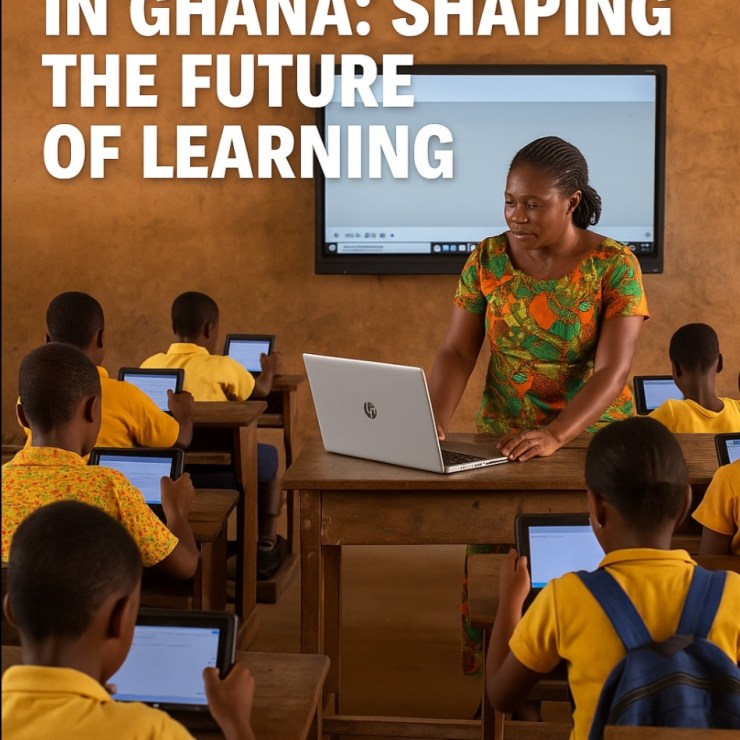Shaping the Future of Learning

Ghana’s education system is at a turning point. Over the past few years, digital learning has gone from a niche alternative to a mainstream necessity.
What started as a response to classroom closures and disruptions has now become a permanent fixture in the nation’s academic landscape.
As Ghanaian students, teachers, and institutions navigate this shift, it’s clear that technology is not just a tool—it’s a powerful driver of opportunity, innovation, and inclusivity in education.

Tech-Driven Classrooms: The New Reality
Today’s students are growing up in a digital-first world. From junior high schools in Kumasi to senior secondary institutions in Tamale, classrooms are increasingly integrating online platforms and smart technologies. Whether it’s using tablets to access lesson materials or relying on digital whiteboards for interactive teaching, the tech transformation is reshaping how knowledge is delivered and absorbed.
More public and private schools are investing in blended learning models—combining in-person instruction with virtual components. This hybrid approach allows teachers to diversify their methods and cater to students with different learning styles and needs.
Online Learning is Reaching the Unreachable
One of the biggest benefits of digital education is its ability to break down barriers. In regions where access to physical schools is limited, e-learning tools are opening doors. Radio-based lessons, SMS learning platforms, and mobile-friendly apps are helping rural students stay connected to their studies.
In fact, several Ghanaian ed-tech startups have designed curriculum-based digital content in local languages. This localized approach ensures that no child is left behind, even in areas with limited infrastructure.
Preparing Students for the Future Job Market
Digital literacy is no longer optional—it’s essential. As Ghana’s economy evolves, future jobs will demand new skills like coding, data analysis, and digital marketing. To stay competitive, students must be equipped not just with academic knowledge, but also with practical, tech-savvy skills.
That’s why many institutions are introducing coding clubs, robotics workshops, and digital entrepreneurship bootcamps into the academic experience. These programs don’t just teach technical know-how; they also inspire creativity, problem-solving, and collaboration—skills employers increasingly value.
Celebrating Educational Milestones in a Digital Age
As students embrace online learning and achieve academic success, it’s important to honor their milestones in meaningful ways. Graduation remains one of the most celebrated moments in any student’s life. With personalization trends on the rise, many are turning to platforms like mygradstoles.com to design custom stoles that reflect their journey, culture, and accomplishments.
These personalized stoles are more than just accessories—they are symbols of hard work, identity, and pride, especially for those navigating new educational landscapes shaped by digital innovation.
The Roadblocks Still Ahead
Despite the progress, digital education in Ghana faces its fair share of challenges:
- Connectivity and Infrastructure: Many rural communities still lack reliable internet and electricity.
- Teacher Training: Educators need continuous professional development to effectively use new tools.
- Cost of Devices: Smartphones, tablets, and laptops are still out of reach for many families.
To overcome these hurdles, collaborative efforts are essential. Government policies, private investments, NGO partnerships, and community-driven initiatives all play vital roles in expanding access and improving quality.
Looking Forward
Ghana’s shift toward digital education isn’t just a trend—it’s a transformative movement. The key to success lies in balancing innovation with inclusion. As more schools, students, and teachers embrace technology, the focus must remain on building an education system that works for everyone, regardless of location or background.
By highlighting these issues, platforms like MyNewsGH.Com Education can continue to keep the national conversation focused on progress, equity, and the future of learning in Ghana.




